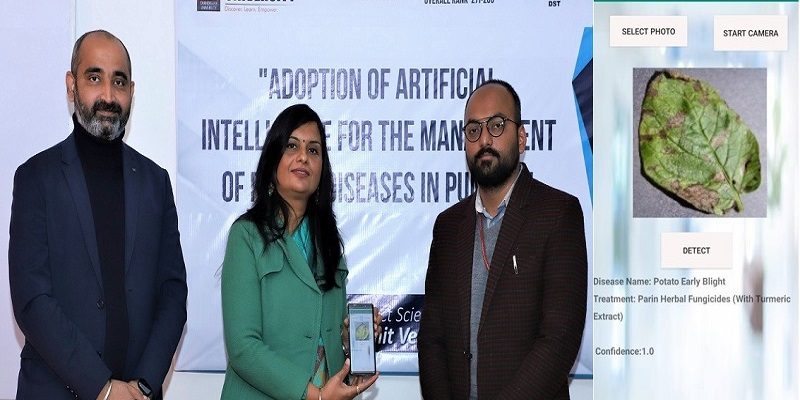Amongst the many problems faced by Indian farmers, the problem of diseases in crops has caused major loss to the farming community. According to an estimate, Indian farmers incur an annual loss of Rs. 90,000 crores due to pests and diseases, which destroys the standing crops in the field. Chandigarh University has come forward to rescue the Indian Farmers from the increasing crop loss problem due to diseases. Department of Research & Development of Chandigarh University has developed an Artificial Intelligence based Mobile Application which will detect the crop diseases at an early stage of farming cycle. This will help the farmers to make arrangements before the spread of disease in the healthy crops. Scientist F of SEED, NCSTC Division, Department of Science and Technology, New Delhi, Dr. Rashmi Singh launched the Mobile App along with Dean Research, Chandigarh University Prof. Sanjeet Singh.
While giving details about the mobile app, the inventor and project scientist of Chandigarh University, Amit Verma said, “The diseases like cut worms, potato tuber moth are common in potatoes. Early and Late Blight in Tomatoes severely damage the crop. To overcome from these and many other diseases, this detecting application can be used to identify and detect the illness in these crops in order to increase agricultural production.” Amit Verma explained that the mobile application works on three step disease detection which is based on Image Processing which matches the current picture of the crop with that of disease infected crop. Using the pattern matching technique the app prompts any significant change in the leaves, stems or branches. In addition, the mobile app offers suggestions to further treat the disease based upon the stage of the crop damaged by the pests and insects. The App will be able to detect 39 diseases in two crops while the study to extend the detection for 19 more crops is currently under-process.
Chandigarh University’s Dean Research, Prof. Sanjeet Singh said, “The app took six months to be completely designed and tested and the research has been funded by the Department of Research of the University.” Chandigarh University has formed a special research group to carry advanced projects in the field of Agriculture and in last three years, the research group has filed 31 patents in the field of Farming and Agriculture, which will be launched soon in the market that will help Indian farmers to overcome their numerous problems, added Prof Sanjeet.
While launching the early diseases detecting application, Dr. Rashmi Sharma, DST Scientist F (SEED, NCSTC Division) department of Science and Technology, New Delhi praised the Chandigarh University’s role in finding the sustainable solutions to the challenges faced by the farmers with the launch of this early detection application and will help farmers across India to overcome from the crops loss. Dr. Sharma while explaining further said that Chandigarh University has performed quintessentially well in terms of research and this shows the great character of Chandigarh University towards the society as this application is going to help millions of farmers across Punjab and India. As India advances more in research and innovation with 8th rank in artificial intelligence with 4000 filed patents in the last 5 years, shows the competence of India in research with the help of artificial intelligence. On explaining the benefits of the application, the eminent scientist Dr. Rashmi Sharma broadly explained the harmful effects of pesticides used in crop protection and its effect on farmers in terms of life taking diseases like cancer.
The Chancellor Chandigarh University Satnam Singh Sandhu said that Chandigarh University has always been in leading role when it comes to research and innovation and has been performing on all fronts to help the society to find out sustainable solutions for the emerging challenges. In order to promote research and innovation, Chandigarh University has a strength of 30 research groups, 14 industry collaborated labs where 800 research scholars are working on various research projects and the university has allocated a budget of Rs. 12 crores annually for the R&D activities, he added.





